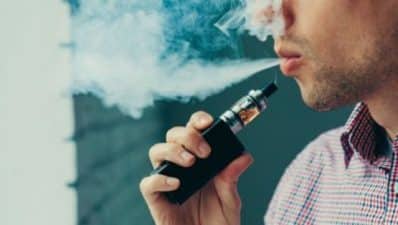
A June 2021 report titled “An Epidemic Continues: Youth Vaping in America” from the U.S. Food & Drug Administration reveals disturbing increases.
Data from 2018 and 2019 show an increased use of e-cigarette products among middle and high school students. In 2020, data showed that 1.8 million fewer American youth were vaping, but 8 in 10 youth reported using flavored products. A strong dependence on vaping was reported in the data with 40 percent of high school students vaping 20 or more days each month, and nearly a quarter vaping every single day. The FDA expressed concern that 3.6 million youth were vaping in 2020.
According to Waynesboro Schools Assistant Superintendent Dr. Ryan Barber, vaping is considered a similar offense to smoking if students are found doing so at school.
“Vaping is a concern for us as a school division,” Barber said.
Responses and interventions to incidents of vaping in school are designed to prevent further behavior issues and keep students in school, but, depending on the severity of the behavior, a student could be removed from the classroom for the short term.
Students caught vaping are required to participate in a student conference and other conferences, mediation or conflict resolution, detention before school, at lunch or after school, and participate in a referral to support services, including a school counselor, Behavior Interventionist or Mentor Program. Administration will review the student’s schedule, restitution by the student may be necessary, and Saturday school may be ordered. The student may also face temporary loss of privileges and in-school suspension.
More serious offenses may result in the student’s short-term removal from school, conference, in-school suspension, referral to support services or community-bases services, a Functional Behavioral Assessment (FBA) and Behavior Intervention Plan (BIP) Development (Special Education Students). Revocation of privileges and restitution by the student are also possible, as well as a referral to alternative education programs. When required, local law enforcement will be notified.
“The challenge is when students vape THC. Then, drug offenses become part of the equation. It is definitely an area of concern for many school divisions,” Barber said.
According to Campaign for Tobacco-Free Kids, in late February 2023, the U.S. Supreme Court refused to hear R.J. Reynolds’ challenge to Los Angeles County’s law which prohibits the sale of flavored tobacco products. The Campaign said the decision should help embolden states and cities across the U.S. to take similar action to protect children.
“Reynolds’ battle against these laws shows once again that the tobacco companies haven’t changed and are lying when they claim to care about anything other than their bottom line. R.J. Reynolds and other companies will stop at nothing in order to continue targeting children and vulnerable communities with flavored tobacco products. Policy makers at every level must stand up to the tobacco industry’s bullying and take action to protect kids and save lives,” Campaign for Tobacco-Free Kids President Matthew L. Myers said in a statement.










